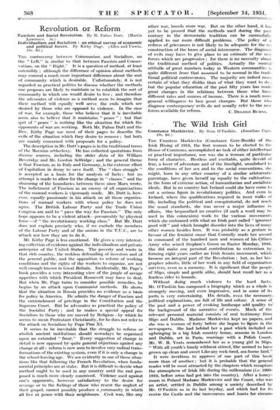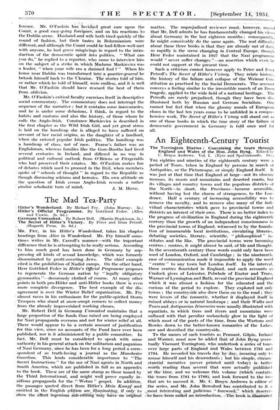The Wild Irish Girl THE Countess Markievicz (Constance Gore-Booth) of
the' Irish Rising of 1916, the first woman to be elected to the House of Commons, accomplished no task of either intellectual or practical importance, nor was she a woman of particular force of character. Restless and excitable, quite devoid of fear, a lover of adventure and of the limelight, unsubdued to the conditions of her sex and to the social conventions, she . might, born in any other country of a similar aristocratic parentage, have given herself up equally to the cultivation, in the form of extreme action, of humanitarian and socialistic ideals. But in no country but Ireland could she have come to cut a serious figure in revolutionary politics. And even in Ireland, where the qualifications required in most walks of life, including the political and conspiratorial, do not reach • the usual standards, she was never a major influence in affairs. She bequeathed no creative (if such a word may be used in this connexion) work to the various movements which she embraced with -what an Irish poet called " ignorant good will " and which brought disorder into the lives of many other women besides hers. It was probably as a- gesture in favour of the feminist cause that Connolly made her second . in command of the hundred men and women of his Citizen Army who seized Stephen's- Green on Easter Monday, .1916. She- did make one personal .contribution to extremism by forming eight years earlier an Irish Scouts movement, which became an integral part of the Revolution ; but, as her bio- grapher admits, little of her work in any field of organization survives, even as a memory. It is significant that the people, of Sligo, simple and gentle alike, should best recall her as a fearless rider to hounds.
Without doing much violence to the hard facts, Mr. O'Faol•iin has composed- a biography which as a whole is strangely moving, and even impressive, and' in some of its parts is very entertaining. His details, even the necessary. political explanations, are full of life and colour. A sense of the past and a power of evoking landscape add quality tot the background of the narrative of events. Much of the relevant -personal material consists of oral testimony frien Sligo and Dublin. Madame Markievicz kept no papers, and. she was a woman of forty before she began-to figure in the newspapers. She had behind her a past which included an upbringing in a big Irish country.. house, seasons in London and Dublin, art in Paris, marriage with a Polish Count.
Mr. W. B. Yeats remembered her as a young girl -in Sligo: " With all youth's lonely wildries4 stirred, She seemed to have
grown up clean and sweet Like any rock-bred, sea-borne bird.", - It were • invidious to approve of one part of this book More than of another ; but it is probable that-the 'general
reader will be most attracted-by the ehapters -which -recapture
the atmosphere of- Irish life during the inillenniurn (i.e. 1900- 1910, before arms had got into the country). After a honey- moon in Poland Madame Markievicz and the Count, who was an artist, -settled-- in Dublin among a - society described by Mr. O'Faatin as in its last heyday, and which had for its centre the Castle and the racecourses and hunts for circum- ference. Mr. O'Faolain has lavished great care upon the Count, a good easy-going foreigner, and on his reactions to the Dublin scene. Husband. and wife both tired quickly of the round of fashion, • but- their tastes in Bohemianism were 'different, and although the Count could be hail-fellow-well-met with anyone, he had grave misgivings in regard to the intro- duction of the democratic spirit into politics. " What can you do," he replied to a reporter, who came to interview him on the subject of a strike in which Madame Markievicz was a leader, " when your wife ees a damned fool ? " When his home near Dublin was transformed intd a quartier-general he betook himself back to the Ukraine. tfie stories told of him. or rather which he told of himself, were endless, and it is well that Mr. O'Faolain should have rescued the best of them from oblivion.
. Mr. O'Faoltin's critical faculty exercises itself in descriptive social commentary. The commentary does not interrupt the ,sequence of the narrative ; but it contains some inaccuracies, and he is under some delusions, I think, in regard to the habits and customs and also the history, of those whom he
• calls the Anglo-Irish. Constance Markievicz is described in the first chapter as the Wild Irish Girl, and yet great stress is laid on the handicap she is alleged to have suffered on ,account of her racial origins, as the daughter of a landlord, Avhen she entered popular Irish politics. The handicap was -a handicap of class, not of 'race. Pearse's father was an Englishman, whereas families like the Gore-Booths had lived several centuries in Ireland, and differed in no way in
• political and cultural outlook from O'Briens or Fitzgeralds who had preserved their estates. Mr. O'Faolain makes fun Of debates which used to proceed in the Dail, when members spoke of " schools of thought " in regard to the Republic as though discussing schisms and heresies. His own attitude on the question of Irish versus Anglo-Irish reveals a rather











































 Previous page
Previous page